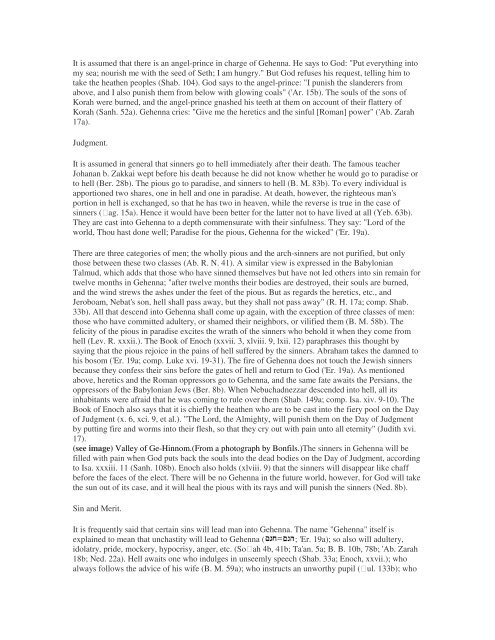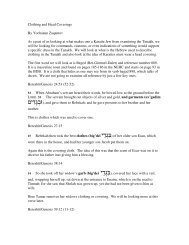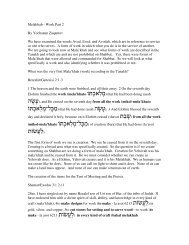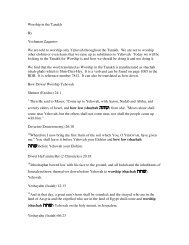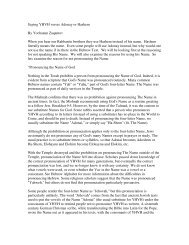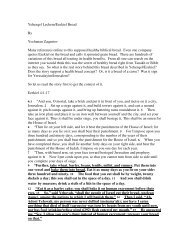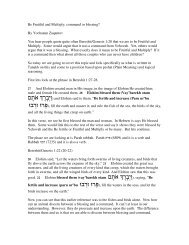Will Death Die? By Yochanan Zaqantov What is ... - Karaite Judaism
Will Death Die? By Yochanan Zaqantov What is ... - Karaite Judaism
Will Death Die? By Yochanan Zaqantov What is ... - Karaite Judaism
Create successful ePaper yourself
Turn your PDF publications into a flip-book with our unique Google optimized e-Paper software.
It <strong>is</strong> assumed that there <strong>is</strong> an angel-prince in charge of Gehenna. He says to God: "Put everything into<br />
my sea; nour<strong>is</strong>h me with the seed of Seth; I am hungry." But God refuses h<strong>is</strong> request, telling him to<br />
take the heathen peoples (Shab. 104). God says to the angel-prince: "I pun<strong>is</strong>h the slanderers from<br />
above, and I also pun<strong>is</strong>h them from below with glowing coals" ('Ar. 15b). The souls of the sons of<br />
Korah were burned, and the angel-prince gnashed h<strong>is</strong> teeth at them on account of their flattery of<br />
Korah (Sanh. 52a). Gehenna cries: "Give me the heretics and the sinful [Roman] power" ('Ab. Zarah<br />
17a).<br />
Judgment.<br />
It <strong>is</strong> assumed in general that sinners go to hell immediately after their death. The famous teacher<br />
Johanan b. Zakkai wept before h<strong>is</strong> death because he did not know whether he would go to parad<strong>is</strong>e or<br />
to hell (Ber. 28b). The pious go to parad<strong>is</strong>e, and sinners to hell (B. M. 83b). To every individual <strong>is</strong><br />
apportioned two shares, one in hell and one in parad<strong>is</strong>e. At death, however, the righteous man's<br />
portion in hell <strong>is</strong> exchanged, so that he has two in heaven, while the reverse <strong>is</strong> true in the case of<br />
sinners ( ag. 15a). Hence it would have been better for the latter not to have lived at all (Yeb. 63b).<br />
They are cast into Gehenna to a depth commensurate with their sinfulness. They say: "Lord of the<br />
world, Thou hast done well; Parad<strong>is</strong>e for the pious, Gehenna for the wicked" ('Er. 19a).<br />
There are three categories of men; the wholly pious and the arch-sinners are not purified, but only<br />
those between these two classes (Ab. R. N. 41). A similar view <strong>is</strong> expressed in the Babylonian<br />
Talmud, which adds that those who have sinned themselves but have not led others into sin remain for<br />
twelve months in Gehenna; "after twelve months their bodies are destroyed, their souls are burned,<br />
and the wind strews the ashes under the feet of the pious. But as regards the heretics, etc., and<br />
Jeroboam, Nebat's son, hell shall pass away, but they shall not pass away" (R. H. 17a; comp. Shab.<br />
33b). All that descend into Gehenna shall come up again, with the exception of three classes of men:<br />
those who have committed adultery, or shamed their neighbors, or vilified them (B. M. 58b). The<br />
felicity of the pious in parad<strong>is</strong>e excites the wrath of the sinners who behold it when they come from<br />
hell (Lev. R. xxxii.). The Book of Enoch (xxvii. 3, xlviii. 9, lxii. 12) paraphrases th<strong>is</strong> thought by<br />
saying that the pious rejoice in the pains of hell suffered by the sinners. Abraham takes the damned to<br />
h<strong>is</strong> bosom ('Er. 19a; comp. Luke xvi. 19-31). The fire of Gehenna does not touch the Jew<strong>is</strong>h sinners<br />
because they confess their sins before the gates of hell and return to God ('Er. 19a). As mentioned<br />
above, heretics and the Roman oppressors go to Gehenna, and the same fate awaits the Persians, the<br />
oppressors of the Babylonian Jews (Ber. 8b). When Nebuchadnezzar descended into hell, all its<br />
inhabitants were afraid that he was coming to rule over them (Shab. 149a; comp. Isa. xiv. 9-10). The<br />
Book of Enoch also says that it <strong>is</strong> chiefly the heathen who are to be cast into the fiery pool on the Day<br />
of Judgment (x. 6, xci. 9, et al.). "The Lord, the Almighty, will pun<strong>is</strong>h them on the Day of Judgment<br />
by putting fire and worms into their flesh, so that they cry out with pain unto all eternity" (Judith xvi.<br />
17).<br />
(see image) Valley of Ge-Hinnom.(From a photograph by Bonfils.)The sinners in Gehenna will be<br />
filled with pain when God puts back the souls into the dead bodies on the Day of Judgment, according<br />
to Isa. xxxiii. 11 (Sanh. 108b). Enoch also holds (xlviii. 9) that the sinners will d<strong>is</strong>appear like chaff<br />
before the faces of the elect. There will be no Gehenna in the future world, however, for God will take<br />
the sun out of its case, and it will heal the pious with its rays and will pun<strong>is</strong>h the sinners (Ned. 8b).<br />
Sin and Merit.<br />
It <strong>is</strong> frequently said that certain sins will lead man into Gehenna. The name "Gehenna" itself <strong>is</strong><br />
explained to mean that unchastity will lead to Gehenna ( ; 'Er. 19a); so also will adultery,<br />
idolatry, pride, mockery, hypocr<strong>is</strong>y, anger, etc. (So ah 4b, 41b; Ta'an. 5a; B. B. 10b, 78b; 'Ab. Zarah<br />
18b; Ned. 22a). Hell awaits one who indulges in unseemly speech (Shab. 33a; Enoch, xxvii.); who<br />
always follows the advice of h<strong>is</strong> wife (B. M. 59a); who instructs an unworthy pupil ( ul. 133b); who


